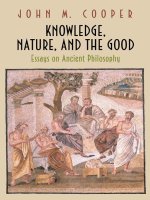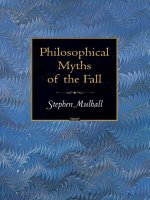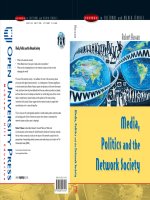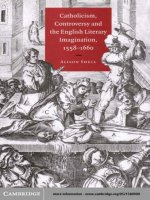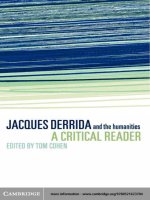princeton university press knowledge nature and the good essays on ancient philosophy oct 2004
Bạn đang xem bản rút gọn của tài liệu. Xem và tải ngay bản đầy đủ của tài liệu tại đây (1.23 MB, 421 trang )
KNOWLEDGE, NATURE, AND THE GOOD
This page intentionally left blank
KNOWLEDGE, NATURE,
AND THE GOOD
ESSAYS ON ANCIENT PHILOSOPHY
John M. Cooper
Princeton University Press
Princeton and Oxford
COPYRIGHT © 2004 BY PRINCETON UNIVERSITY PRESS
PUBLISHED BY PRINCETON UNIVERSITY PRESS,
41 WILLIAM STREET, PRINCETON, NEW JERSEY 08540
IN THE UNITED KINGDOM: PRINCETON UNIVERSITY PRESS,
3 MARKET PLACE, WOODSTOCK, OXFORDSHIRE OX20 1SY
ALL RIGHTS RESERVED
LIBRARY OF CONGRESS CATALOGING-IN-PUBLICATION DATA
COOPER, JOHN M. (JOHN MADISON), 1939–
KNOWLEDGE, NATURE AND THE GOOD:
ESSAYS ON ANCIENT PHILOSOPHY / JOHN M. COOPER
P.
CM.
INCLUDES BIBLIOGRAPHICAL REFERENCES AND INDEX.
ISBN 0-691-11723-3 (ALK. PAPER)—ISBN 0-691-11724 (PBK. : ALK. PAPER)
1. PHILOSOPHY, ANCIENT. I. TITLE.
B171.C684 2004
180—DC22
2003065498
BRITISH LIBRARY CATALOGING-IN-PUBLICATION DATA IS AVAILABLE
THIS BOOK HAS BEEN COMPOSED IN SABON
PRINTED ON ACID-FREE PAPER. ∞
PUP.PRINCETON.EDU
PRINTED IN THE UNITED STATES OF AMERICA
1
3
5
7
9
10
8
6
4
2
CONTENTS
Preface
vii
Acknowledgments
ix
KNOWLEDGE
CHAPTER 1
Method and Science in On Ancient Medicine
3
CHAPTER 2
Plato on Sense-Perception and Knowledge (Theaetetus 184–186)
43
CHAPTER 3
Plato, Isocrates, and Cicero on the Independence of Oratory from Philosophy
CHAPTER 4
Arcesilaus: Socratic and Skeptic
81
NATURE
CHAPTER 5
Aristotle on Natural Teleology
CHAPTER 6
Hypothetical Necessity
107
130
CHAPTER 7
Two Notes on Aristotle on Mixture
CHAPTER 8
Metaphysics in Aristotle’s Embryology
CHAPTER 9
Stoic Autonomy 204
148
174
65
vi
CONTENTS
THE GOOD
CHAPTER 10
Two Theories of Justice
247
CHAPTER 11
Plato and Aristotle on “Finality” and “(Self-)Sufficiency”
CHAPTER 12
Moral Theory and Moral Improvement: Seneca
309
CHAPTER 13
Moral Theory and Moral Improvement: Marcus Aurelius
Bibliography
Index of Passages
General Index
369
381
397
270
335
PREFACE
I
N REASON AND EMOTION (Princeton, 1999) I collected most of
the papers on ancient ethics and moral psychology that I had written
up to that time. By then I had also published a number of essays on
other aspects of ancient philosophy. In the meantime I have written further essays both on ancient moral philosophy and on ancient epistemology, metaphysics and physics, and philosophy of mind. Since these have
appeared in a widely dispersed set of journals, proceedings, and specialist collections, and even though several of them have been reprinted in
anthologies, friends and colleagues have urged me to bring them together
in this second volume of essays. By doing so, I hope to give readers easier
access to the older papers, which continue to be read in courses and seminars, and which are reprinted here with no substantial changes. But I
also include revised and expanded final versions of four of the most recent
papers (chapters 1, 7, 9, and 11). One paper, chapter 13, appears here for
the first time.
These thirteen essays are on diverse topics from different periods of ancient philosophy. The topics range from Hippocratic medical theory and
Plato’s epistemology and moral philosophy to Aristotle’s physics and
metaphysics, Academic skepticism, and the cosmology, moral psychology, and ethical theory of the ancient Stoics. They are unified only insofar as, throughout, I have attempted, whatever the particular topic being
pursued, to understand and appreciate the ancient philosophers’ views in
philosophical terms drawn from the ancient philosophical tradition itself
(rather than by bringing to them, and interpreting them in terms of, contemporary philosophical concepts and debates). Through engaging creatively and philosophically with the ancient philosophers’ views, these
essays aim to make ancient philosophical perspectives available in all
their freshness, originality, and deep, continuing, philosophical interest to
philosophers and philosophy students of the current day. I am certainly
not alone nowadays in adopting such a personal point of view in my
writing about ancient philosophy. I am pleased to think that by presenting these papers to a wider public than the specialist audiences to which
they were addressed in their original places of publication, I can hope to
help both to propagate this approach to the study of ancient philosophy
and to gain appreciation for its fruits among the philosophical community in general.
These essays are the product of more than thirty-five years’ work on
problems of ancient logic, metaphysics, physics, moral psychology, and
ethical and political theory. I owe too much to too many people over
viii
PREFACE
these years—for instruction, advice, assistance, encouragement, and (not
least) intellectual companionship—to be able to thank them all. But,
though by now the debt is an old one, I cannot fail to mention my teacher
and then colleague in the 1960s, G.E.L. Owen, who was an inspiration to
me both in my early days and ever since. My Princeton (earlier, Pittsburgh) colleague, Alexander Nehamas, read and commented on almost
all these essays, in many cases at more than one stage of preparation. His
friendship and support have been indispensable.
I incurred several specific debts in the final preparation of the book. I owe
thanks, once again, to Donald Morrison for his help in selecting the art
for the book’s cover, and to Christopher Noble for his help with the bibliography. I thank Princeton University for granting me leave, and the
American Council of Learned Societies for its fellowship support, during
academic year 2002–03, when much of my time was spent finishing up
several of the essays and putting the book together. I owe thanks also for
Molan Goldstein’s assistance, at a later stage, in copyediting a bunch of
very disparate essays, most of them published according to very different
editorial standards, into a uniform, attractively presented book; and to
Carol Roberts for preparing the indexes.
Finally, I thank my wife Marcia—for everything.
One editorial note: I have collected in the bibliography full bibliographical information for both secondary articles and books that I cite, and for
editions and translations of the primary sources. In footnote citations, I
give the author’s name, title of the work, and, where relevant, editor’s or
translator’s name, together with an abbreviated title that I hope will be
easily recognized by readers familiar with the literature in the specific
area covered. Others need only turn to the bibliography under the name
in question in order to obtain full information.
Princeton University
ACKNOWLEDGMENTS
C
HAPTERS 1–6 and 8–12 appeared in their original form, or are to
appear, in the following publications; chapters 1, 9, and 11 have
been expanded and extensively revised for inclusion here. The second half of chapter 7 was previously published, as noted below. Chapter
13 has been written especially for this volume.
1. “Method and Science in On Ancient Medicine,” in Helmut LinneweberLammerskitten and Georg Mohr, eds., Interpretation und Argument
(Würzburg: Königshausen & Neumann, 2002), 25–57. With permission of
the publisher.
2. “Plato on Sense-Perception and Knowledge (Theaetetus 184–186),”
Phronesis XV (1970), 123–146. With permission of Koninklijke Brill NV,
Leiden, The Netherlands.
3. “Plato, Isocrates and Cicero on the Independence of Oratory from
Philosophy,” in J. J. Cleary, ed., Proceedings of the Boston Area Colloquium in Ancient Philosophy, vol. 1 (1985) (Lanham, Md.: University
Press of America, 1986), 77–96. With permission of the publisher.
4. “Arcesilaus: Socratic and Sceptic,” in V. Karasmanis, ed., Year of
Socrates 2001—Proceedings (Athens: European Cultural Center of Delphi,
2004). With permission of Prof. Karasmanis and the European Cultural
Center of Delphi.
5. “Aristotle on Natural Teleology,” in M. Schofield and M. C. Nussbaum, eds., Language and Logos (Cambridge: Cambridge University Press,
1982), 197–222. With permission of the publisher.
6. “Hypothetical Necessity,” in A. Gotthelf, ed., Aristotle on Nature and
Living Things (Pittsburgh: Mathesis Publications, 1986), 151–167. With
permission of the publisher.
7. “A Note on Aristotle on Mixture,” in J. Mansfeld and F. de Haas, eds.,
Aristotle: On Generation and Corruption I Proceedings of Symposium
Aristotelicum XV (Oxford: Oxford University Press, 2004), 315–326.
8. “Metaphysics in Aristotle’s Embryology,” Proceedings of the Cambridge Philological Society no. 214 (1988), 14–41.
9. “Stoic Autonomy,” Social Philosophy and Policy 20 (2003), 1–29.
With permission of Cambridge University Press.
x
ACKNOWLEDGMENTS
10. “Two Theories of Justice,” Proceedings and Addresses of the American
Philosophical Association 74:2 (2000), 5–27. With permission of the American Philosophical Association.
11. “Plato and Aristotle on ‘Finality’ and ‘(Self-)Sufficiency,’” in R. Heinaman, ed., Plato and Aristotle’s Ethics (London: Ashgate, 2003), 117–147.
With permission of Ashgate Publishing, Ltd.
12. “Moral Theory and Moral Improvement: Seneca,” forthcoming in J. J.
Cleary and Gary Gurtler, eds., Proceedings of the Boston Area Colloquium
in Ancient Philosophy, vol. 19 (Leiden: Brill, 2004). With permission of
Koninklijke Brill NV, Leiden, The Netherlands.
KNOWLEDGE
This page intentionally left blank
CHAPTER 1
METHOD AND SCIENCE IN
ON ANCIENT MEDICINE
I
T
HE TREATISE On Ancient Medicine is nowadays one of the most
admired, and most studied, of those making up the Hippocratic
Corpus. Surprisingly, perhaps, this favored position is a distinctly
modern phenomenon, one not found among the ancients. In the midsecond century a.d., Galen knew the work,1 but he did not devote a commentary to it, as he did to many others in the Hippocratic Corpus that he
thought most important and worthwhile. He even wrote commentaries on
some he thought entirely or largely “spurious,” that is, not by the “great”
Hippocrates.2 But he almost totally ignored On Ancient Medicine—
according to him also a “spurious” work. He seems never to refer to it by
name in any of his works surviving in Greek. So far as I can determine he
refers to it only once in his surviving works altogether—namely, in the
commentary on Epidemics II that survives in the Arabic of Hunain IbnIshaq, which was itself translated into German in 1934 by Franz Pfaff3 (I
come back to this passage shortly). Galen seems nowhere to discuss any
of its main claims or themes, either to reject them as “un-Hippocratic”
(as he certainly must have thought many of them; I return to this below)
or to congratulate the author for having gotten something right. (As
usual with Galen, that would mean something in agreement with Galen’s
own views but not nearly as well expressed.) Likewise, the opinions in
this treatise apparently did not figure in any positive way in the work of
those of Galen’s more immediate predecessors from whose views, as well
of course as his own extensive independent reading, Galen formed his
1
In his Hippocratic Glossary he explains some words that appear in the corpus only in On
Ancient Medicine (hereafter AM)—though without naming the work. See J. Jouanna, ed.,
De L’Ancienne médicine, 97–99.
2 For example, the commentary on Prorrhetic I and the part of the commentary on Regimen
in Acute Diseases dealing with the “spurious” appendix.
3
Corpus Medicorum Graecorum (hereafter CMG) 5.10.1, In Hippocratis Epidemiarum Librum I Commentaria, ed. Ernst Wenkebach, and In Hippocratis Epidemiarum Librum II
Commentaria ex Versione Arabica, ed. Franz Pfaff.
4
CHAPTER 1
own conception of Hippocrates and Hippocratic medicine.4 Otherwise
he would have attacked them for their error, and thus been drawn into
some discussion of the work itself.
Thus the evidence suggests that by about the end of the first century
a.d.—the time when, according to Wesley Smith, Hippocrates and the
Hippocratic Corpus were being canonized as ultimate authorities in medical research—On Ancient Medicine was ignored or even dismissed by
leading medical theorists. Interestingly, however, it seems that the treatise
had earlier figured quite prominently in the establishment of the Empiric
school of medicine. Galen mentions that Heraclides of Tarentum and
Zeuxis, two prominent Empirics respectively of the early and late first
century b.c., wrote commentaries on “all the books of Hippocrates.”5
But it is quite unclear what he thought that meant; in any event we seem
to have no record of any commentary by either of them on On Ancient
Medicine. Still, Smith draws attention to a passage of Galen—the one I
referred to above, from the Arabic text of the commentary on Epidemics
II—and one of Celsus, as supporting his own suggestion that the original
Empiric writers of the third century b.c., or at any rate such later adherents of the sect as Heraclides and Zeuxis, made a special point of appealing to the treatise to authorize their own anti-rationalist methods.6 (I
come back below to the question of proto-Empiric method in On Ancient
4
On these see Wesley D. Smith, The Hippocratic Tradition. 64–74.
See the introductory remarks to his commentary on In the Surgery (κατ᾿ ητρε›ον, De Officina Medici), Kühn XVIII B, 631. The remark is repeated in the introduction to the commentary on Humors in the Galenic corpus, which is a Renaissance forgery (Kühn XVI 1).
6 See Smith, Hippocratic Tradition, 208–10. The Galen passage comes in his comment on
Epidemics (hereafter Ep.) 2.2.12: “One must say that in hemorrhage, patients develop a
greenish color (§κχλοιοËνται), and one can find many other such things related to wetness
and dryness, to hotness and coldness” (Smith trans. in the Loeb edition of Hippocrates, vol.
VII). Galen, referring to Ep. 2.1.10, interprets the text as relying on the following explanation: the loss of blood brings about coldness in the liver, which in turn weakens it so that
the blood it produces from the juices coming from the nutriment in the stomach is “unfinished”; this results in the discoloration of the skin referred to. He points out that this passage confirms his attribution to Hippocrates, in his own work On the Elements, from
Hippocrates, of the view (it is his own as well) that cold, heat, wetness, and dryness are fundamental properties and constituents of the body, any significant excess or deficiency of
which is deleterious to health and needs to be corrected by redressing the balance. He cites
(CMG 5.10.1, p. 220) unnamed others who interpret this text (he does not tell us just how
they managed that) as holding the same view as the “work entitled On Ancient Medicine,”
namely that cold, hot, wet, and dry are not fundamental for curing diseases, and offering
further evidence for it. That is ridiculous, says Galen, given that in On the Nature of Humans, Aphorisms, and “the other genuine writings” of Hippocrates—even elsewhere in
Ep. II itself—it is so very clear that Hippocrates expresses the precisely opposite view. Anyone should be able to see that he is saying the same thing here too. Galen does not assign
these interpreters to any particular sect, but given the prevalence of Empiric writers among
5
METHOD AND SCIENCE
5
Medicine: the method recommended is really, I argue, if we are to use
these later terms at all, deeply “rationalist” and not “Empiric.”) The
Empirics seem to have inaugurated the practice of writing commentaries
on Hippocrates (as opposed to mere glossaries explaining the meaning of
odd or archaic or specifically Ionic forms in the works of the corpus; the
latter seem to have begun, as the Empiric sect itself did, in and around the
circle of Herophilus in mid-third century Alexandria). So it may well be
that the Empirics did pay special attention to, and place special value on,
our treatise—interpreted, of course, in their own ways. Even if that is so,
the attention paid to On Ancient Medicine in antiquity was relatively
short-lived: already by the end of the first century a.d., as I have noted,
the treatise had effectively dropped out of sight, and Galen’s influence in
later antiquity and medieval and early modern times made it remain so.7
On Ancient Medicine was not regarded as one of the major works of
the Hippocratic Corpus until in 1839, Littré, thinking that evidence in
the older commentators it is plausible to suppose, with Smith, that he is citing Empiric
commentators.
Celsus, in his Prooemium 33–35, reports the Empirics as having traced the beginning of
medicine to the observations of alert persons in noticing what happened when sick people
in the early days of an illness did or did not take food, or took it before, or in the midst of,
or just after an onset of acute fever, or ate a full or a reduced quantity. Accumulated experience of this sort led the first physicians to the position where they could accurately prescribe appropriate diets for people when ill, and specify occasions either to take or to omit
food, all with beneficial results for their patients. This is very close in general outline to the
much elaborated account of the origin of medical science that the author of AM gives in
chaps. 5–7 (an account we find in no other early text). The similarity is striking and does, I
think, lend support to Smith’s suggestion. (See further below, section V, on “Empiric”
methodology as prefigured in AM.)
7 Jouanna in the Notice to his Budé edition (p. 8), reports that AM was not translated either
into Latin or into Arabic in late ancient or medieval times. I should add that Celsus (early
first century a.d.) does not refer to, and makes no use of, AM (which is perhaps not surprising, at least so far as books 3–8 are concerned, given their subject matters). In the introduction to his Glossary of Hippocratic Terms the grammarian and literary scholar
Erotian, writing later in the first century, includes AM among the genuine works of Hippocrates “tending toward the theory of the (medical) art,” along with Oath, Law and On
the Art. See E. Nachmanson, ed., Erotiani vocum Hippocraticarum collectio cum fragmentis, 9. And in quite a few places the author of the little treatise On Rabies lifts clauses and
phrases from AM chap. 20 (see M. Pohlenz, “Das zwanzigste Kapitel von Hippokrates de
Prisca Medicina”), and also others from several other works. (On Rabies is preserved in one
manuscript as the nineteenth so-called Letter of Hippocrates—the treatise is allegedly being
sent by Democritus in a letter to Hippocrates. Hermann Diels edited it, dating it to early imperial times; see “Hippokratische Forschungen V”). It is curious that rabies is not discussed
anywhere in the Hippocratic Corpus; indeed, its Greek name, λÊσσα, occurs in the corpus
only once, in fact in AM chap. 19, where it seems not to refer to the disease, but to frenzy
or mad agitation in general. But in both these cases the interest in the work is purely literary, and no attention is paid to or use made of its theoretical ideas.
6
CHAPTER 1
Plato’s Phaedrus (270c–d) establishes it as a genuine work of the great
Hippocrates himself, placed it first in his epoch-making edition of the
corpus. For Littré, in On Ancient Medicine Hippocrates himself explains
the methods proper to medical research (while vigorously rejecting newfangled ones based on pre-Socratic philosophizing about nature), and
sets out the basic principles underlying all medical knowledge. Littré’s inference from the passage in Plato was not generally approved, but both
the Teubner editor H. Kühlewein (1894) and W.H.S. Jones in the Loeb
Classical Library (1923) nonetheless followed him in placing On Ancient
Medicine at the head of their editions. The work has been the subject of
a vast number of specialized studies in the past hundred and fifty years,
and it must nowadays be among the most widely read and appreciated
works in the corpus—even if current scholarship has renounced the attempt to assign the authorship of this or indeed any Hippocratic writing
definitely to the physician of Cos. In what follows I explain and discuss
the questions about the methods appropriate to the practice and theory
of medicine, and indeed of natural science as a whole, to which this relatively short treatise is centrally devoted. My discussion will, I hope, provide new grounds for admiring its anonymous author’s intellectual daring
and his truly fascinating ideas about the proper bases for theory construction in the sciences of nature. At the same time, in both interpreting
and assessing his views, we will need to attend closely to the questions I
have raised about his position in the history of ancient medicine.
II
I begin by giving a heavily interpretative and in parts controversial summary of the work’s main line of analysis and argument. In explicating and
discussing the author’s views in later sections of this essay, I draw attention to the controversial aspects of my interpretation, and attempt to defend them. Here, then, is the summary.
Our author insists that well before his own time (he was probably writing about 420–410 b.c.)8 there already existed a true “art” of medicine—
or, as we should rather translate the word τ°χνη in this context, science
(1.9, 12.10–16).9 He insists that this traditional science of medicine, of
8
This is the date accepted by Jouanna (Budé ed., 84–85), chiefly on the basis of the reference to Empedocles in chap. 20, and something close to a consensus seems to favor it nowadays.
9
For convenience I cite here the lineation marked in the margins of the Loeb text; in subsequent references I add also the page and line of the Budé. (Except where something significant may turn on it, I ignore differences between these two texts: in general, Jouanna prefers
METHOD AND SCIENCE
7
which he presents himself as a practitioner, had been from the very beginning established firmly and directly upon the actually existing, true
foundations for any real knowledge of human health and illness—that is,
for any real knowledge of their constitution and causes—and the means
available to human invention for sustaining the one so far as possible and
avoiding, moderating, and eliminating the other. A firm commitment to
these foundations was involved in the method (ıδÒς) for investigating
medical questions that, from the beginning, traditional Greek medicine
employed. If only investigators continue to use the same method—fortified by a knowledge of, and beginning their investigations from, the accumulated discoveries of their predecessors—the whole science (≤ τ°χνη
πᾶσα ≤ ητρικỈ, AM 8.18-20 = 127, 12–14; see also 2.1–5 = 119, 12–16)
can without doubt one day actually be completed: the best physicians
will then know everything that actually can be known about health and
the various diseases, and about how to treat the latter (so far as the nature of things permits their knowledgeable treatment at all).
to follow the more challenging text of manuscript M, while Jones opts for the often
smoother and easier text of A.) The two passages cited here are found respectively at p. 118,
8 and 132, 18–133, 7 of the Budé edition. To these references one might add 2.9–11 = 119,
19–120, 2—especially if, with the Budé, one reads ˜τι §στ ν (A) (that the science exists) at
2.11 instead of the Loeb’s ˜ τι §στ ν (M) (what it is); in that case the author announces the
whole subsequent discussion, from there until the end of chapter 12, as devoted to establishing the existence of this science. (Jones, the Loeb editor, also opted for A’s text in his subsequent edition and retranslation, “Philosophy and Medicine in Ancient Greece.”) In his
note to 120, 2, Jouanna points to 12.10–16 = 132, 18–133, 6 as making A’s text preferable,
since it concludes the discussion here announced by saying explicitly that a certain consideration is not a good ground for denying the existence of the ancient science. However, that
remark develops (and rebuts) a specific criticism of traditional medicine that arises somewhat coincidentally out of the author’s argument in chaps. 9–11 and should not be taken as
marking a return to the language of this initial statement of what is to be accomplished in
chapters 2–12. In chaps. 9–11 the author shows, by examining what happens to certain
people in health, that in cases of illness, overeating is in principle just as harmful as eating
too little. Hence it is necessary to adopt a not precisely quantifiable regimen, more complex
than that given by the simple rule to avoid all “strong” food and have recourse directly to
the “weakest”—gruel. The discussion of these points has stimulated the admission on his
part that medical science cannot attain to complete and full exactness in its dietary prescriptions, but must make do with a “rough” sort of precision that permits small errors. He
mentions this point first at 9.13–22 = 128, 9–17, and he resumes it at 12.10 ff. = 132, 18 ff.
(the passage to which Jouanna refers), at the conclusion of an intervening analysis of the effects on some healthy people of departures from their usual (beneficial) diets. There, he insists that the absence of “full exactness” is no ground for declaring medicine no science or
its alleged discoveries no discoveries at all but due to mere chance: on the contrary, it is a
great achievement to have come by way of reasoning “close to that which is most exact,”
and a proof that traditional medical inquiry has proceeded finely and correctly. Since the
author addresses this objection in connection with his own developing account of traditional medicine, it seems inappropriate to cite this passage as evidence for the right textual
8
CHAPTER 1
Recent theorists of medicine, however, our author complains—he does
not name them, and it will not serve our purposes to speculate about
whom he might have had in mind10—seemed to assume that traditional
Greek medicine had not yet attained the status of a true science. According to them, it was neither a science itself nor based on any τ°χνη (1.8–20
= 118, 7–119, 4). And that in turn was because, they thought, it had not
yet reached the true foundations and correct first principles for the
knowledge of health and illness. They held that the true first principles of
medicine must be drawn from an investigation of the “nature of a human
being,” and that this can only be known by knowing general principles
for nature as a whole (20.1–8 = 145, 17–146, 7). And, they thought,
the correct method for obtaining such general natural knowledge, and
the knowledge of human nature in particular—based on that general
knowledge—is to lay down first as foundations (ÍπỊθεσιν Íποτ θεσθαι,
1.2 = 118, 2) a small number of a certain range of abstractly conceived
natural powers. The next step would be to use those ultimate “powers”
as explanatory principles to work out all the further details—including
the specification of particular human diseases, their causes, and the
proper therapies for them (1.1–6 = 118, 1–6; 13.3–7 = 133, 8–13). Thus
these recent theorists thought that advances in philosophy of nature and
in the grasp of the proper methods of scientific inquiry urgently demanded,
reading at 2.11 = 120, 2: the grounds on which the author’s opponents actually denied to
traditional medicine, or on which he considers that they denied, the status of a science, are
to be grasped from what he says in chapter 1 (together with chaps. 13 and 20), and any failure of “full exactness” seems remotely connected at best to what he says there. For what
this may be worth, one should note that the author of On the Science of Medicine (Περ‹
τ°χνης) does not include any such argument against the scientific status of traditional medicine among the many that he rebuts. As for the choice of textual reading at 2.11 = 120, 2,
I cannot see any basis in the context for preferring A’s text over M’s: if (as in M) the author
announces he is going to explain what medical science is, he is certainly going therein to explain and show that it is. Furthermore, the author has in fact already given arguments to establish that medical science exists: see 1.8–20 = 118, 7–119, 4. His proper next task is to
explain what it is (and thereby confirm its existence). Hence M’s text might seem preferable.
10 The best discussion remains that of G.E.R. Lloyd, “Who Is Attacked in On Ancient Medicine?” Lloyd’s intriguing suggestion that the doctrines attacked in AM are most closely exemplified, so far as our evidence allows us to say, by those of Philolaus has been taken up
by Carl A. Huffman, whose study of Philolaus’ theory of “ἀρχα ” and his methodology in
general adds support to this suggestion (Philolaus of Croton, 78–92). Given, however, the
paucity of our evidence about Philolaus’ specifically medical theories, and the necessarily conjectural character of any reconstruction of them (even more is this so for other philosophers/
physicians who have been canvassed in this connection), it would not help us much if we
knew that Philolaus was our author’s principal target. We would not be much aided thereby
in attempting to work out our author’s own views about proper procedure in medicine, or
the bases for his objection to his opponent(s)’ procedure; for all this, we must go to his own
text.
METHOD AND SCIENCE
9
and indeed also made possible, a reconstruction of traditional Greek
medical practice in philosophically and scientifically more satisfactory
terms. Or rather, what was demanded and possible now was its replacement by a new practice conducted in terms of these new abstract foundational principles (2.5–6 = 119, 16–18).
So much, then, for our author’s introduction in the first two chapters
of the issues he will be concerned with. He vigorously objects to this attack, as he regards it. His purpose in the treatise is to explain the traditional method (ıδÒς, 2.2, 4.8, 8.20, 15.2 = 119, 13; 123, 16; 127, 14;
137, 13), its origin (ἀρχỈ, 2.2, 7.15 = 119, 13; 126, 16), and its principles, and to show its superiority, both in actually dealing with patients
and in the theory of medicine, to that of the newfangled philosophical
medicine (chaps. 3–12). In both practice and theory, the purely abstract
principles of natural philosophy, he argues (mentioning the hot and the
cold, the wet and the dry), are inappropriate to medicine (chaps. 2,
13–14). The powers at work in the human body, of which medical science must have a thorough knowledge and to which it must appeal both
in theory and in practice, are fundamentally and irreducibly many, specific, and concrete. They must be understood in differential, concrete
terms if either practice or theory is to sustain itself in the face of the observed facts: many different physical substances are hot or cold or wet or
dry, and they have different effects depending on their other ingredients
and the way those are combined, much more than they depend on the
warmth or coldness, wetness or dryness, in them. In fact, these abstract
powers made so much of by the philosophers have little lasting effect on
the condition of the human body. Indeed, he argues, the hot and the cold
are demonstrably the least powerful of all the powers, so far as human
nature, health, and disease are concerned (chaps. 16–19). In denying all
real efficacy in particular to the hot and the cold (and backing this up
with detailed arguments drawn from medical experience) our author
strikes a bold counterstroke, since from the beginning of his discussion
(1.3–4 = 118, 3–4) he implies that the leading candidates for foundational principles proposed by newfangled medicine were precisely the hot
and the cold.
But, on one possible interpretation, which I will defend later on (see
note 47), he goes yet further in giving tit for tat. In chapter 20 he asserts
that if anyone is ever to achieve a true grasp of the nature of a human
being, and by implication a grasp of any of the principles constituting
and governing nature itself as a whole, it will only be from the investigation, according to traditional methods of the science of medicine, of the
human constitution and human health and disease (20.11–17 = 146, 9–15).
In other words, whereas his opponents have asserted that one must begin
from the knowledge of basic principles for the constitution of the world
10
CHAPTER 1
as a whole (the whole cosmos) and on that basis lay down principles for
human nature, health, and disease, our author reverses this order. Yes, as
the philosophers say (20.1–4 = 145, 17–146, 3), you cannot really know
medicine without knowing the nature of human beings, and so also without knowing nature itself as a whole, but that is because in first knowing
medicine—and only so—will you have what you need in order then to
understand human nature and nature overall as well. The correct procedure for coming to know nature itself as a whole—for grasping the general principles for understanding the cosmos—is to study human nature,
health, and disease according to the traditional method of Greek medicine. Natural knowledge in general (and not just medical science) begins
from and is grounded in the investigation of the concrete facts at the bottom, so to speak. It is not suspended, as the philosophers asserted, from
abstract principles developed first at the top and applied there first.
III
So much, then, for my summary. I have represented our author throughout as directing his explication and defense of traditional Greek medicine
against a single, coherent opponent—newfangled philosophical medicine,
I called it. I have drawn my account of philosophical medicine entirely
from what the author says about it (see note 10). He introduces certain
opponents explicitly in the first words of chapter 1 as some “people who
have undertaken to speak or write about medicine while themselves laying
down for their account an underlying principle.” (The Greek of the participial phrase here is ÍπỊθεσιν αÈτο‹ αÈτο›ς Íποθ°µενοι τ“ λỊγƒ;11 I
discuss below in section IV my rendering of ÍπỊθεσις as “underlying principle.”). Soon thereafter he characterizes them as proposing “new methods” for medical research (2.7 = 119, 17),12 and he explicitly returns to
them in chapter 13. I assume that these are the same people referred to and
argued against in chapter 20, even though the language with which the author brings them on there is neither the same nor closely related; it could
certainly be interpreted as marking some specifically different, further set
of opponents. First, then, let me defend this assumption.
At the beginning of chapter 20, in a somewhat abrupt transition, our
author begins to address the views of “certain physicians and wise (or
clever) men” (τινες ητρο‹ κα‹ σοφιστα ):13 they held that you cannot
11
The Budé text differs slightly but, for present purposes, not significantly.
See also 15.1–3 = 137, 12–13.
13
I have cited the Loeb text, which follows manuscript A at this point; according to
Jouanna’s apparatus, the other manuscripts have τινες κα‹ ητρο‹ κα‹ σοφιστα , which he
12
METHOD AND SCIENCE
11
know medicine without knowing “what a human being is.” Notice, first,
that he employs the old term σοφιστα here, not φιλÒσοφοι. This perhaps indicates that about 420–410 b.c., when I am assuming our author
wrote, the latter noun was not yet firmly established, at least not as a
quasi-technical designation of any special group of thinkers, as it certainly was by Plato’s time not long afterward. However, he does go on to
say that their views go in the direction of philosophy—and now he uses
the term φιλοσοφ η, in what seems to be one of the earliest, and perhaps
the earliest, occurrence of this word in surviving Greek literature. The
opponents in chapter 1, however, are initially described simply as “speakers and writers on medicine.” But though they are not specifically described
as philosophers there (whether σοφιστα or adherents of φιλοσοφ η), it
is clear from the nature of the underlying principles they lay down that in
fact they are either philosophers of nature themselves or physicians influenced by natural philosophy. The passage quoted above referring to their
use of an underlying principle specifies this as “hot or cold or wet or dry,
or whatever other thing they may choose.” Hot, cold, wet, dry, and so
on, are pre-Socratic cosmological and physical principles par excellence.
The author goes on to say that these “speakers and writers” choose “one
or two” such underlying principles and reduce “the beginning of the causation of the diseases and death of human beings” all to this or these
same source(s) (1.4–6 = 118, 4–6); on this basis, they “cast aside and reject as unworthy” both the traditional method of Greek medicine and all
its discoveries, and follow a new method of their own (2.6–7 = 119,
16–18), namely the method of laying down underlying principles drawn
from physics and cosmology. It is this laying down first of an underlying
principle or principles in physics and cosmology, and then proceeding to
employ it or them to explain diseases and death that he succinctly refers
to at the beginning of chapter 13, when he describes his opponents as
“those who do research in the science [of medicine] in the newfangled
way, from an underlying principle” (13.1–2 = 133, 6–7). He claims there
(he does not say this explicitly, but he clearly assumes it) that it is because
in physical theory, hot and cold, or wet and dry, being opposites, are fundamentally at odds with each other, that when one of these theorists says
that the hot is responsible for someone’s disease he must recommend
also prints. That would yield a more distinct separation of the personages referred to into
two groups: “certain physicians and certain wise or clever men,” i.e., philosophers. M’s and
the other manuscripts’ reading is perhaps supported by the fact that just below, at 20.9 =
146, 7–8, when our author rejects as less appropriate to medicine than to the art of painting what “any wise man or any physician” (τιν‹ ŭ σοφιστª ŭ ηρ“) has said or written
“about nature”: there he speaks separately about two groups, philosophers and physicians.
But the effective difference between the two texts is slight.
12
CHAPTER 1
treating it with an application of the cold, and mutatis mutandis for the
dry and the wet (13.5–7 = 133, 10–13)—which is absurd, as our author
then argues.14
Thus, even though he does not use any such descriptions, our author
clearly identifies his opponents in the opening two chapters, and in the
further discussion of their views in chapter 13 and following, as natural
philosophers and physicians influenced by such philosophers’ theories
and methods. He is clearly understanding them in those terms, and attacking them for it. When we turn to chapter 20, we see him describing
the λÒγος of the “certain physicians and wise men” (that is, their theories or arguments) likewise as “tending toward philosophy” in their way
of explaining their view that one must have complete knowledge (καταµαθε›ν) of what a human being is in order to correctly treat human beings
medically (20.3–5 = 146, 2–4). He compares them with “Empedocles and
others” who wrote “on nature” (περ‹ φÊσιος)—that is, who engaged in
pre-Socratic natural philosophical and cosmological theorizing. In the
course of writing about nature, he implies, Empedocles and these others
wrote about “what man is from the beginning [or, perhaps: from a first
principle],15 and how he first came to be and from what things he was put
14
It is important to notice that the author, whose own physiology is also based on a series
of qualities that include opposites like sweet and bitter, does not think he has to, and indeed
he does not, base his therapy on bringing to bear somehow an opposite or oppositely qualified substance to counteract whichever one is prominently involved in a disorder. His own
theory holds that you must reduce or transform the offending substance by bringing it back
into a state of being blended and tempered together with the totality of the other constituent
substances of the body—it is its isolation that causes the trouble, and to introduce into the
body some other, opposite substance in equally isolated form would only make things vastly
worse. There is no reason at all to suppose that doing so would help with restoring the
blended, tempered condition of the originally offending substance.
15 It is not clear whether §ξ ἀρχ∞ς at 20.7 = 146, 5 goes with γεγράφασιν or §στιν, a question on which commentators and translators have divided: its placement would make it go
grammatically most naturally with γεγράφασιν, where that has as its complement ˜ τ
§στιν ἄνθρωπος. But in either case (all the more if it is taken with both verbs), I wonder
whether it means “from a beginning, i.e., a principle” of their own devising (compare 13.2
= 133, 8: ζητεÊντων §ξ Íποθ°σιος), rather than, as some commentators say, either “from
the beginning of their books” or “from (man’s) origin.” Elsewhere in the treatise it does
seem that ἀρχỈ means beginning or starting point in a literal, temporal sense, and not in
the metaphorical one of a “first principle.” That would not, of course, absolutely rule out
an interpretation of this passage along these latter lines. In any event, the phrase if taken in
the temporal sense does not yield an entirely satisfactory sense. It would imply something
clearly incorrect if it means “from the beginning of their books”—Empedocles’ poem seems
clearly not to have begun with a discussion of human physiology, anatomy, and so on, but
rather with the general principles governing reality as a whole, and before that with remarks on the senses vs. reason as the authoritative source of information about reality (see
M. R. Wright, Empedocles: The Extant Fragments), if not actually with a prelude on spiritual purification (as the new Strassburg fragments suggest, see below, note 18). But if the
METHOD AND SCIENCE
13
together” (20.6–8 = 146, 4–7).16 And indeed, if we have in mind his earlier complaints against the speakers and writers who use hot and cold or
wet and dry as their underlying principle, we can readily see the force of
this comparison by considering the fragments of Empedocles’ poem on
nature. Starting from his four “roots” (earth, air, fire, and water) plus Love
and Strife as “underlying principles,” Empedocles describes a cosmic cycle
in which human beings and other animals come into being at a certain
point, with their specific natural constitutions determined by the ways
those “roots” mix together in the given case. Ancient tradition describes
meaning is “wrote about what a human being is from the time when humans first originated,” that pointlessly and awkwardly anticipates what the author goes on to say immediately after: “and how he first came to be and from what things he was put together” (my
italics). The author seems to be marking two topics—connected, to be sure, but distinct—
that his opponents discussed: human nature itself, what it is; and how human beings originally came into being, what elements and the like they were put together from. Just below,
in stating his own contrary views, he again separates the question about human nature from
that about origins: except by following traditional methods of medical research one cannot
know “what a human being is and through what causes humans come to be” (20.16–17 =
146, 13–15).
16 The received text at 20.6 = 146, 5 is mildly ungrammatical: the καθάπερ clause lacks a
main verb. It does seem clear that the phrase ᾿Εµπεδοκλ∞ς ŭ ἄλλοι ο„ περ‹ φÊσιος γεγράφασιν was intended to mean “Empedocles or others who have written about Nature”—i.e.,
authors of philosophical books of the sort that went, at least later on, under the title Περ‹
φÊσεως (On Nature). Empedocles’ own physical poem was given this name in the doxographical tradition, and though we do not know whether it went under that name in his
own lifetime it must have done so shortly afterward. This is how Festugière translates the
phrase (L’Ancienne médecine, 58–60 nn. 69–70). Thus we can begin from the firm basis
that here, at its first occurrence in the context, the phrase περ‹ φÊσιος means “about nature
as a whole.” However, in the received text this phrase does not stand alone as complement
to the verb γεγράφασιν: the latter is qualified also by ˜ τ §στιν ἄνθρωπος κτλ., so that
the clause as a whole reads: “who have written about nature, [viz.] what man is. . . .” That
may make it look instead as if with this phrase our author is not taking note of philosophers
of nature as such (and assigning Empedocles and others to that classification)—as on my interpretation he is doing. Instead, it may seem, he is speaking of a group of persons who, he
says, wrote specifically on the nature of humans. In fact, as we can see from the instance of
Empedocles, these may be writers of works “On Nature,” though on this alternative reading that is not how our author is referring to them. On this interpretation our author takes
no notice of the fact that Empedocles et al. wrote on the nature of humans as a subordinate
and applied part of an overall theory of nature as a whole; he is thinking of them solely as
writers on the nature of humans. That is how Jouanna translates in the Budé, and in a note
on the passage (p. 208) he insists that all the occurrences of the phrase περ‹ φÊσιος in this
chapter, following along with this reference for the first occurrence here, have to do specifically with human nature, never (even in part) with nature in general. The result would be
that here in chapter 20 our author is objecting simply to the view of these “physicians and
wise men” that one cannot know medicine without first knowing “what a human being
is”—without implying anything at all about a connection between the desiderated knowledge of human nature and pre-Socratic cosmology. We can avoid any temptation to accept
this bizarre result and preserve the natural meaning of ο„ περ‹ φÊσιος γεγράφασιν as re-
14
CHAPTER 1
Empedocles as a physician17 as well as a natural philosopher, perhaps
partly on the basis of more extensive medical applications of his cosmological and overall physical theory than now survive in the poem itself.18
At any rate, we can readily see that the initial opponents and the thinkers
of chapter 20 at least belong to the same intellectual milieu: the latter,
too, make claims about the source of true medical knowledge as lying in
pre-Socratic cosmological theorizing like that of Empedocles, in which
postulated “underlying principles” are made the basis for explaining
everything. Our author admittedly does not, however, explicitly identify
ferring to a recognized category of writers of works “On Nature,” if we simply permit the
author (writing informally and with directness and vigor as he does throughout) to have intended the verb γεγράφασιν to be heard twice: once in the relative clause (“who have written about Nature”) and then again as verb of the καθάπερ clause (“as for example those
who have written about Nature have written what man is from a (or the) beginning [or:
from a first principle] . . .”). This way of completing the syntax of the καθάπερ clause is
easier and makes for a much better sense than Jouanna’s own proposal (p. 207) that we complete it by understanding (from the verb τε νει of the main clause) τε νουσι §ς φιλοσοφ ην.
Jouanna’s proposal makes the author say that Empedocles et al. tend toward philosophy,
just as do our “physicians and wise men” when they insist that in order to treat patients scientifically you have to know “what a human being is”—when in fact his point is plainly to
assimilate his opponents (who write directly and specifically only about medicine) with such
professed and recognized specialists in philosophy as Empedocles. Empedocles does much
more than merely tend toward philosophy, and the author’s point is spoiled if we do not see
him exploiting that fact!
The ungrammaticality discussed in this note would disappear if, with A. Dihle (“Kritischexegetische Bemerkungen zur Schrift Über die Alte Heilkunst,” 135–50), we regarded the
words at 20.3–7 = 146, 2–5 (ἀλλὰ τοËτο . . . §στιν ἄνθρωπος), which are dropped out in
manuscripts written later than A and M (both dating from the 11th c.), as actually signaling an interpolation in A and M (see ibid., 145–46): in that case, all reference to Empedocles as an author who wrote on Nature and on the origin, etc., of human beings in
particular would drop out of our text, as an intrusion from a marginal note in some archetype of A and M, while the later mss. would in this place reflect an independent tradition
that preserved a text uncontaminated by this interpolation. However, there seems no reason
to think the later manuscripts are, or derive from, anything but sometimes faulty copies of
either A or M, and it seems impossible not to see in the omission the fault of a copyist whose
eye skipped down from ˜ τ §στιν ἄνθρωπος in line 3 to the same words in line 7. On this
see Jouanna in the Budé, 93–94.
17 See, e.g., Diogenes Laertius, Lives of Eminent Philosophers, 8. 58, Celsus, De medicina
prooemium 7 (which lists Empedocles along with Pythagoras and Democritus as early
philosophers who thought medicine necessarily came within the scope of the philosophical
knowledge of nature which they sought); Galen, De methodo medendi I 1. Diog. Laert.
8.77 actually attributes to Empedocles a work (of 600 lines) with the title Medical Theory
(᾿ΙατρικÚς λÒγος), but most scholars do not accept his evidence. Wright, Empedocles,
9–14, 19–20, surveys this and the other evidence about Empedocles’ connections to medical science.
18
Later ancient authors cite Empedocles’ poetry under two different titles (and Diog. Laert.
8.77 gives these titles in such a way as to suggest there were two poems), leading most
